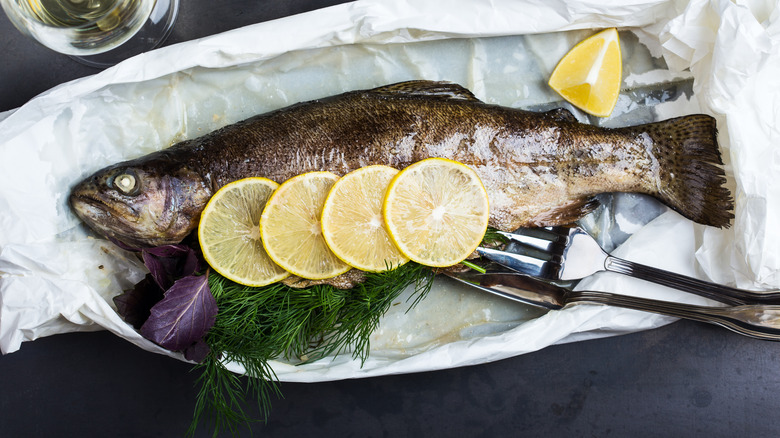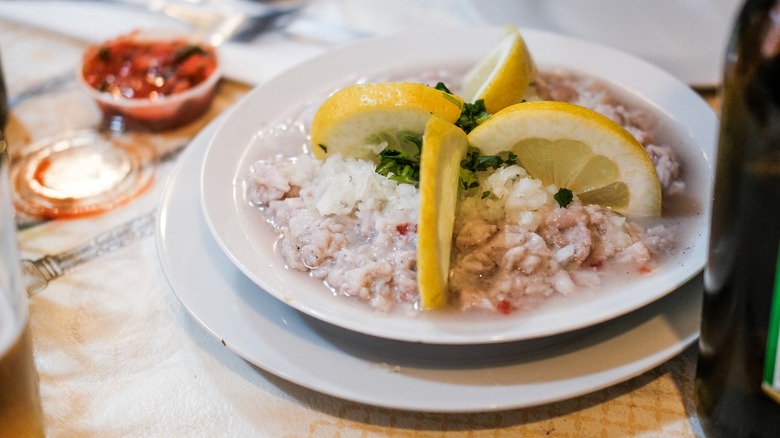Why Is Fish Traditionally Served With Lemon?
The short answer to why we serve fish with lemon is the same reason we eat fries with ketchup, hot dogs with mustard, and pumpkin pie with whipped cream: It just tastes good. Deep in the mists of time, somebody tried it, liked it, all their friends and family followed suit, and it went the pre-social media version of viral. If we want to do a deeper dive into exactly what makes lemon a perfect piscine pairing — and clearly we do, otherwise this would be a pretty short piece — there are numerous other reasons.
Some of them are fairly obvious: Certain types of fish are quite bland and lemon provides some much-needed zinginess. Conversely, some other fish can taste a bit too fishy, and adding an acidic element helps balance out the brine. The scientific reason for this is that fish contains an alkaline compound called trimethylamine that's neutralized by citric acid.
Abandoning science for speculation, we could also draw a line between the fact that in earlier centuries, those in maritime occupations including fishing were frequently plagued by scurvy. In 1753, however, a Scottish surgeon named James Lind discovered that lemon juice was an effective preventative. We now know that vitamin C deficiency causes scurvy, which is why it can be warded off by citrus consumption. While there doesn't seem to be direct evidence that people started adding lemon to fish for scurvy prevention, there could be a connection.
One apocryphal story credits lemon as a lifesaver
If you're a fan of "wacky facts," you may have come across an assertion that people in the Middle Ages thought eating a slice of lemon with fish would prevent them from choking on any accidentally swallowed bones. They believed lemon juice could dissolve fish bones, which isn't quite true, although acid may help to soften them. The problem isn't so much the veracity of the claim, but that with all due diligence, we couldn't find even a hint of primary source documentation (This is not an editorial "we," since this research effort involved multiple people).
There are two things we uncovered that somewhat support the idea, however, and one of these is that in times gone by, people really seemed to have a thing about fishbone choking. We don't know how common it was, but there is a Roman Catholic saint — Saint Blaise — whose top miracle involved saving a child from choking on such a bone by blessing his throat. Even today, if you attend mass on his feast day of February 3, you can have your throat blessed by a candle-wielding priest. The other piece of possibly corroborative evidence comes from two early 20th-century sources, a 1913 issue of Hunter-Trader-Trapper and a 1918 book called The Rural Efficiency Guide. Both of these publications, though hardly medieval, relay the (possibly ancient) folk wisdom that lemon juice can help if you choke on a fishbone.
Beyond the wedge: Other ways to lemonize your fish
A lemon wedge is often plopped on the side of a plate of fish, while in more upscale establishments, lemon wheels may be artistically arranged on top as a garnish. While both of these approaches allow for some DIY lemon application, there are better ways to give your fish some lemony flavor. One way is to make a lemon-butter pan sauce (this is so easy, it'll work even if you suck at cooking fish), while another is to add lemon juice before baking the fish en papillote (cut the paper into hearts if it's Valentine's Day and you're feeling cutesy). You can also top your fish with gremolata, a kind of parsley condiment that includes lemon zest and juice.
If you want to go all in on scurvy prevention, though, you can always use lemon juice to make ceviche. Ceviche, which can be a perfect no-cook, no-stink summertime lunch or dinner, involves marinating the fish in an acidic juice. Lime juice is typical, but lemon juice works as well, or you can combine the two. The juice doesn't cook the fish so much as quick-pickle it, in the process changing the proteins to the point where the flesh firms up. The acid also kills off sufficient bacteria to make ceviche relatively safe to eat, but even so, food safety dictates that you should use sushi-grade fish to make the dish and avoid it altogether if you're pregnant or immunocompromised.


